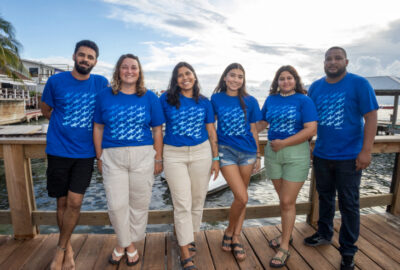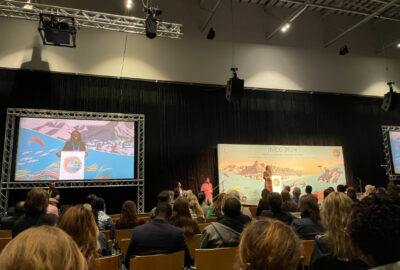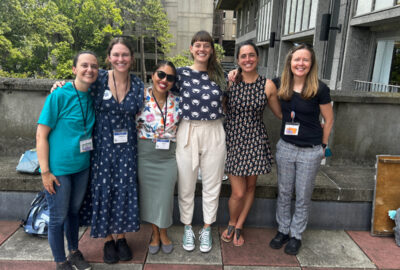The Aquarium will be closed to the public on Wednesday, April 2, for an internal staff event. Regular operating hours will resume on April 3.
It’s More Than Just Thresher Shark Conservation
By New England Aquarium on Tuesday, July 23, 2024


This post is one of a series on projects supported by the New England Aquarium’s Marine Conservation Action Fund (MCAF). Through MCAF, the Aquarium supports researchers, conservationists, and grassroots organizations around the world as they work to address the most challenging problems facing the ocean.
By Rafid Shidqi, Thresher Shark Indonesia
Three years ago, I envisioned expanding our thresher shark conservation efforts beyond Alor Island to other regions of Indonesia, specifically the Maluku region in the Banda Islands to the northeast. It still feels surreal to finally stand on top of Fort Belgica, overlooking Gunung Api, one of the eleven small volcanic islands of Banda, after heavy rains have poured down on the archipelago. This stunning view before sunset made me fall in love with Banda for the first time.
Pelagic thresher shark populations are shrinking across Indonesia. We’ve received reports about thresher shark catches in Banda, primarily from dive operators and communities visiting Banda for leisure. They’ve asked us if we’ve seen thresher sharks and why there isn’t a project targeting their conservation in the region. We’ve heard a lot about Banda’s scalloped hammerhead, which is always a main attraction for advanced divers who come to see them schooling on the reefs of Hatta Island in Banda. However, there is not much information about thresher sharks.
We secured funding support in 2022 from the New England Aquarium’s Marine Conservation Action Fund (MCAF) to investigate the population status of thresher sharks on Rhun, one of the Banda Islands. This project provided the first comprehensive information on the status and utilization of the endangered species. Our project also aimed to explore the human dimensions of shark conservation and discover potential conservation interventions to prevent further declines. While the area at the heart of the coral triangle is indeed beautiful, it is also exceptionally remote, with very few transportation options. People who wish to come to Banda must commit to an at least 18-hour ferry ride from Ambon, in addition to the four to five-hour plane ride from Jakarta. This remoteness may be why few conservation initiatives exist in Banda, especially for thresher shark conservation.
Self-Awareness, Ethics, and Conservation
In my view, learning from the people we aim to work with is the most crucial aspect of achieving meaningful conservation outcomes. For issues such as thresher shark conservation, it is mandatory to hear and understand the fishers’ perspectives. Shark conservation often intersects with complex social, economic, and political matters; if we are not careful, we may create an adverse outcome for these communities.

After discussing with various people, including government officials, fishers, and communities in Banda, we learned that most fishers live below the poverty line. Fishing is a vital livelihood for them, and if we are not careful in developing conservation solutions, such as banning thresher shark fisheries, it could harm their economic well-being. Fortunately, the fishers in Rhun mentioned that they do not target thresher sharks since they have no market value; instead, they are bycatch in their fisheries. This provides an opportunity for conservation intervention.
The Island of Rhun and their Dark Histories
The colonial history of Rhun is crucial in building self-awareness and ethical conservation practices. We must ensure that we refrain from perpetuating the same colonial practices on which conservation was unfortunately founded.
In elementary school, I only knew about Banda because it was used to exile our National Heroes, such as Bung Hatta and Sjahrir. At that time, they were planning strategies to fight against the Dutch colonization that had occupied Indonesia for hundreds of years. Bung Hatta and Sjahrir were Indonesian scholars who pursued higher education and used education as a ‘weapon of resistance.’ Despite their exile in Banda, they mobilized Indonesian youths to fight for liberation against the colonization and brutality of the Netherlands.
Rhun, part of Banda’s island chain, was famous for its spice commodities and became the backbone of the global spice trade in the early 17th century. Because of this wealth, the Dutch colonizers attempted to monopolize Rhun’s spices and engaged in the enslavement and mass killing of its indigenous population. While the Netherlands committed these crimes and genocide against the Indigenous Bandanese, they also ‘traded’ Rhun in 1667 for ‘New Amsterdam,’ now known as New York. Rhun was referred to as ‘New Manhattan’ at that time.

Today, the footprints of the genocide of indigenous Bandanese by the Dutch are still apparent in various paintings on the walls, trying to recall this dark history. Some indigenous people of Banda were either exiled or killed. The island was then repopulated by enslaved Indonesians from regions like Sumatra or Java. I was fascinated by this story when I heard it from Pak Alim, one of the elders who let us stay in his home while we conducted surveys and engaged the fishers in Rhun in thresher shark outreach. The history was so painful that the people of Banda sometimes still try to recover from their past trauma of this brutality, which wiped out more than 90% of the indigenous population.
Since co-founding Thresher Shark Indonesia in 2018, I have wondered how we can help these Banda communities transition away from unsustainable shark fisheries to ensure the longevity of their fishing culture and marine ecosystems. Thankfully, there is an ongoing discussion about conservation and ethics within the global conservation community. Hopefully, we can begin to reimagine conservation in a way that is just, equitable, and fair.
What’s Next For Thresher Sharks of Banda?
The one-year implementation of the Thresher Shark Indonesia project in Banda made me realize that protecting sharks is not the only goal. Field trips to Banda and engaging with its people taught me the humility to listen and learn more from them. It has been very enlightening because learning about Banda’s history and fisheries practices and witnessing the stunning landscape has made me consider a holistic approach to conservation.

Since we now know that thresher sharks are bycatch and that fishers dislike catching them because it is detrimental to their financial operations (thresher sharks can destroy nets), we have developed a methodology for the safe release of pelagic thresher sharks in collaboration with the fishers of Rhun and other Banda Islands residents. We have engaged 17 fishers to collaborate in safely releasing pelagic thresher shark bycatch, providing them with a small incentive to replace fuel and fishing gear broken or lost due to bycatch incidents.
This may be a temporary solution, but we actively discuss and listen to fishers about their experiences. In the future, we aim to invent technological or social solutions that fit Banda’s social and political situations to completely mitigate the bycatch of thresher sharks in the archipelago.
Conservation is a long journey, but we are ready to continue learning and listening to the communities most affected. Because ocean conservation should be shaped by the people who live at its shore.




